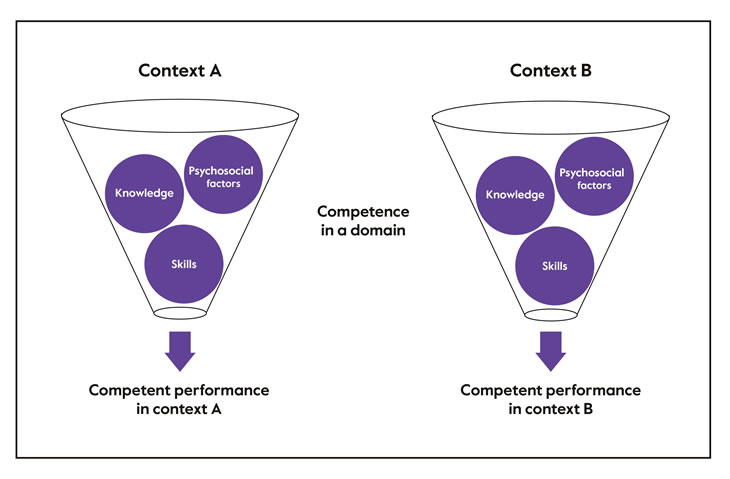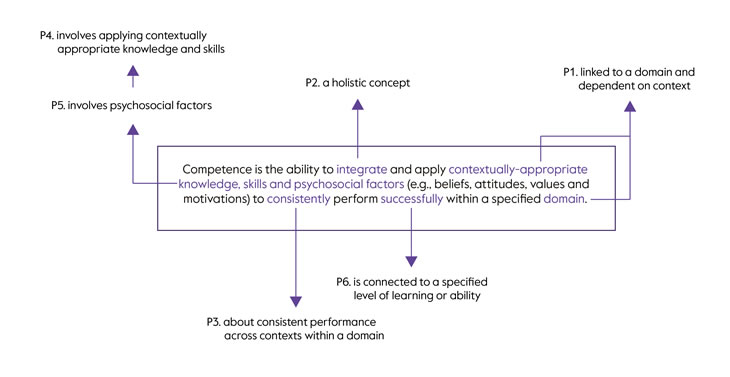You may be familiar with the word ‘competence’, but how can a clear definition of the term support teaching, learning and assessment?
A new research report published by Cambridge University Press & Assessment explores what we mean by competence. Two of three authors, Sylvia Vitello and Jackie Greatorex, explain the background to the report, what’s in it, and why clarity about what competence means is so important.
What is the report about and why did you write it?
Our report is focused on the meaning of competence. We wanted, in particular, to explain (and define) this term in a way that would support anyone working on teaching, learning or assessment.
Our colleagues were the ones who prompted us to write it. We’re researchers in Cambridge University Press & Assessment’s central research division, which means we work with colleagues from different product groups and teams all over the organisation. Some years ago, colleagues approached our division asking for support in developing educational products to support competence development in their learners. The recurring question we heard was, “What does competence mean?”, and there was not a single, clear answer. Everyone had a different view. So, there was a real need for clarity within our own organisation. We also soon realised how fragmented the debates around competence still are within the wider educational field and research literature.
Why is competence important?
Competence is an important topic in education because, fundamentally, someone who is competent is able to perform successfully in the domain that they’ve developed competence in (e.g., mathematics, carpentry). Therefore, developing competence is invaluable for the individuals themselves but also for workplaces and life settings, ultimately having benefits for the economy and society more widely.
Competence is often discussed in the context of employment and vocational programmes of study. Yet competence is relevant for a wide range of educational areas and stages, including general (non-vocational) education, primary, secondary and higher education. Indeed, over the last two decades competence has become a key focus of international debates in general education, promoted by organisations such as the OECD and the European Commission. Thus, educational providers are being increasingly expected to help learners develop competence to prepare them for future education, work and life. We argue that the first step to achieving this is to be really clear about what competence means.
Why is it important to have a clear understanding of competence?
The benefits of having a clear understanding of competence are:
- it encourages an analytic approach to assessment, teaching and learning
- it indicates how to break down competence appropriately, supports high quality education
- it makes us better placed to engage with issues of how competence links with models of curriculum, learning, and assessment.
Without a clear understanding, the risks could include
- failing to develop learners’ competence
- dividing up the teaching of a subject in an inappropriate or ineffective way
- omitting the teaching of valuable information or content
- wasting learners’ and teachers’ time.
So, how do you define competence in your report?
We developed the following definition by delving into the research and educational literature, as well as consulting with our own colleagues who are in assessment and education experts.
Competence is the ability to integrate and apply contextually-appropriate knowledge, skills and psychosocial factors (e.g., beliefs, attitudes, values and motivations) to consistently perform successfully within a specified domain.
We can visualise this definition in the image below. The rectangular box containing the two funnels is a domain (the area of study/work that the competence is in). Within the domain there are multiple contexts (e.g., the two funnels in the image below, context A and B). Contexts can have different characteristics and requirements. Someone who has competence in a domain is able to perform competently in different contexts because they are able to apply the appropriate combination of knowledge, skills and psychosocial factors.

In our report we have accompanied our definition of competence with a discussion of six principles explaining the fundamental features of competence that are relevant to teaching, learning and assessment. We believe that, together, the definition and these principles help us to reach a shared understanding of competence that will support teaching, learning and assessment.
- Principle 1: competence is linked to a domain and dependent on context.
- Principle 2: competence is a holistic concept.
- Principle 3: competence is about consistent performance across contexts within a domain, which supports predictions of future performances.
- Principle 4: competence involves applying contextually-appropriate knowledge and skills.
- Principle 5: competence involves psychosocial factors, which affect performance and influence learning.
- Principle 6: competence is connected to a specified level of learning or ability.
Why did you need to come up with your own definition of competence?
Many of you may be asking: why did we come up with another definition when there are other ones out there? For example, looking at the Cambridge English Dictionary, we can see it contains multiple definitions of competence such as “the ability to do something well” and “an important skill that is needed to do a job”. The simple answer is that all the definitions we found did not seem sufficient enough to support teaching, learning and assessment. We carefully constructed our definition so it included words that targeted every one of those six principles (P) of the meaning of competence, as demonstrated in the diagram below.

How do you see the definition being used?
We hope that our report helps provide clarity around the meaning of competence in education. We want this definition to help keep the key fundamental features of competence at the forefront of discussions and decisions made about competence, especially during the development of teaching, learning and assessment materials.
Read the full research report ‘What is competence? A shared interpretation of competence to support teaching, learning and assessment’ on our Assessment Network and Research website.
Discover more blogs in our series on the outline principles for the future of education.